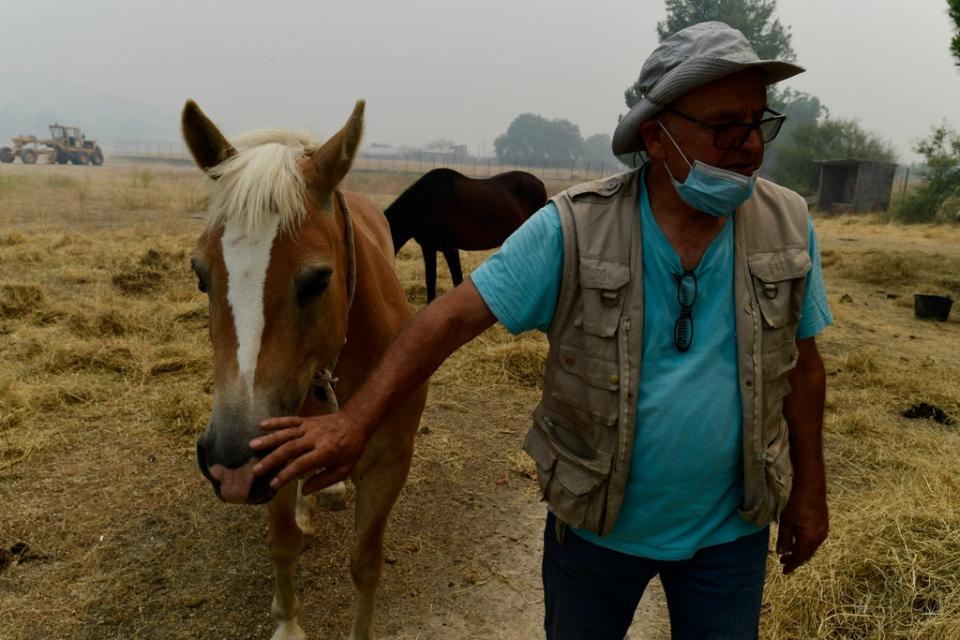‘The sky has changed colour’: Fires rage for seventh day on Greek island of Evia
Residents and firefighters have tackled a massive forest fire on the Greek island of Evia for a seventh successive day on Monday, a blaze which has sent thousands fleeing and left many homeless.
Fires were reported to be burning in forests near villages with up to a third of the island being destroyed, according to reports. Smoke and ash from the fire on Evia, Greece’s second-biggest island after Crete, has blocked out the sun and turned the sky orange.
Evia’s fire is the most severe of dozens that have broken out across Greece in the past week, after the country was baked by its worst heatwave in three decades which saw temperatures soar to 45C for days.
The heat, which comes during what has already been a particularly hot summer, has turned Greece’s forests, including large areas of easily flammable pine trees, into bone-dry tinderboxes.
The wildfires have stretched Greece’s firefighting capabilities to the limit, and the government has appealed for help from abroad. More than 20 countries in Europe, including the UK, and the Middle East have responded, sending planes, helicopters, vehicles and manpower.
Greek NBA star Yannis Antetokounmpo, along with a betting company, is paying the cost for 80 hotel rooms for people who lost their homes in the fires.
Greeks from across the country and diaspora around the world are collecting food, medicine, and clothes to send to the fire victims.
In the beach village of Agia Anna in Evia, the blazes destroyed 10 houses, one camping site, and a horse farm. Sisters Nancy and Debbie Kourellou had to rescue their eight horses, two donkeys, and 13 dogs before the fire arrived.
"The sky has changed colour," Debbie says. “Some of the horses ran away. The fire was like ‘Pacman’, it kept eating the forest and the villages.”
She added: “I’m not sure if this farm is viable. The trees are all burnt and at any point they might fall on our heads. The ground is filled with nails and the horses are in danger of stepping on them and getting tetanus.”
Despite the help from overseas, many residents and local officials have complained of a lack of firefighters, and some have taken to calling Greek television networks to appeal for help.
“We were completely forsaken. There were no fire brigades, there were no vehicles, nothing!” David Angelou, who had been on Evia in the seaside village of Pefki, said.
“You could feel the enormous heat, there was also a lot of smoke. You could see the sun, a red ball, and then, nothing else around.”

On Monday, the flames continued across northern Evia, threatening yet more villages. Satellite imagery from the European Union’s Earth Observation Programme showed vast tracts of the island charred, with fire having cut across it from coast to coast.
Overnight, residents and firefighters managed to save most of the village of Pefki, on the island’s northern tip, where fast-moving flames entered the outskirts over the weekend. A ferry that had been sent to Pefki to potentially evacuate people by sea turned into a temporary shelter.
Monday morning saw dozens of local residents, many with their pets, sleeping on lounge chairs of Pefki’s pebble beach.
Massive fires have also raged for more than 10 days in neighbouring Turkey, where firefighters were still trying to extinguish blazes in five locations in the coastal province of Mugla.
Read More
World’s 1.5C goal slipping beyond reach without urgent action, warns landmark IPCC climate report
Paradise lost: How the Turkish wildfires destroyed one of the most beautiful places I have ever seen
IPCC report: UK calls for all countries to produce tougher climate plans to keep 1.5C goal in reach
From shrinking glaciers to more intense heat waves: What the new IPCC report means for South Asia
Ask The Independent’s Climate Correspondents anything about the landmark IPCC report

